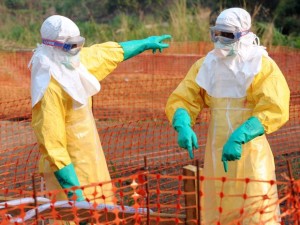
 A number of critical issues will be on the minds of world leaders as they convene for the United Nations General Assembly this week, including the ongoing crisis from the Ebola outbreak in West Africa. The virus has already claimed the lives of over 2,500 people in Liberia, Sierra Leone, and Guinea, and the difficulties in diagnosing and containing the virus have shown why a coordinated approach across the public and private sectors will be necessary to counter a disease that is ravaging West Africa.
A number of critical issues will be on the minds of world leaders as they convene for the United Nations General Assembly this week, including the ongoing crisis from the Ebola outbreak in West Africa. The virus has already claimed the lives of over 2,500 people in Liberia, Sierra Leone, and Guinea, and the difficulties in diagnosing and containing the virus have shown why a coordinated approach across the public and private sectors will be necessary to counter a disease that is ravaging West Africa.
President Obama stressed that America was “prepared to take leadership on this to provide the kinds of capabilities that only America has, and to mobilize the world in ways that only America can do.”
While calling on global leaders to speed up their responses, the President announced coordinated U.S. efforts that would help West African countries fight the epidemic.
The whole-of-government U.S. approach has brought together USAID, the military, as well as the development and philanthropic community to deliver an effective response to the outbreak. USAID has been on the ground since August through deployment of a Disaster Assistance Response Team to oversee and coordinate the U.S. response. The Centers for Disease Control (CDC) and the military are delivering treatment units to prevent the further spread of Ebola, as well as airlifting medical supplies to the countries. This coordinated humanitarian approach is utilizing U.S. Africa Command’s support because of its ability to deploy resources, supplies, and personnel rapidly. There are already 60 military personnel on the ground in Liberia led by Maj. Gen. Darryl A. Williams, with more on the way to fulfill President Obama’s request to respond to the outbreak.
The NGO and philanthropic communities are also partnering with the federal government and the affected countries to deliver training and healthcare kits to the most affected areas. The Paul G. Allen Foundation and World Vision have already pledged to help bring medical supplies to the areas that need it the most, while Save the Children and Population Services International (PSI) are on the ground in Liberia and Guinea to train local health workers and educate communities about preventative measures.
Already, West African governments are taking significant steps of their own to try and contain the Ebola outbreak, especially with the recent three-day lockdown conducted by Sierra Leone, which appeared to have been successful. However, if the outbreak has taught us anything, it’s that a disease of this magnitude can still be a challenge to identify and contain. A recent investigation of the outbreak highlighted these challenges and the fact that Ebola could be easily mistaken for other, similar diseases in this part of the world, including malaria or cholera.
Given the magnitude of the challenges with the virus itself, there is no shortage of fear about what the consequences could be if the outbreak continues unabated. Michael Gerson explained the potential implications, pointing out that “A virus infecting a single patient…can reduce three countries (Liberia, Guinea, and Sierra Leone) to desperation and civil disorder, result in the August declaration of an international health emergency by the World Health Organization and raise the prospect of further spread and (more remotely) of disastrous genetic mutation.” The CDC is already preparing for the worst, announcing this week the worst-case scenario could be 1.4 million cases in four months.
The coordinated approach of development and NGO communities alongside the military can have an impact in containing the epidemic from spreading even further and potentially preventing consequences on West Africa’s economy and national security, but it will take some time.
President Obama said last week, “the world is looking to us, the United States, and it’s a responsibility that we embrace.” Throughout our history, the United States has provided leadership on humanitarian crises through our development and diplomacy programs – this is just the latest example.